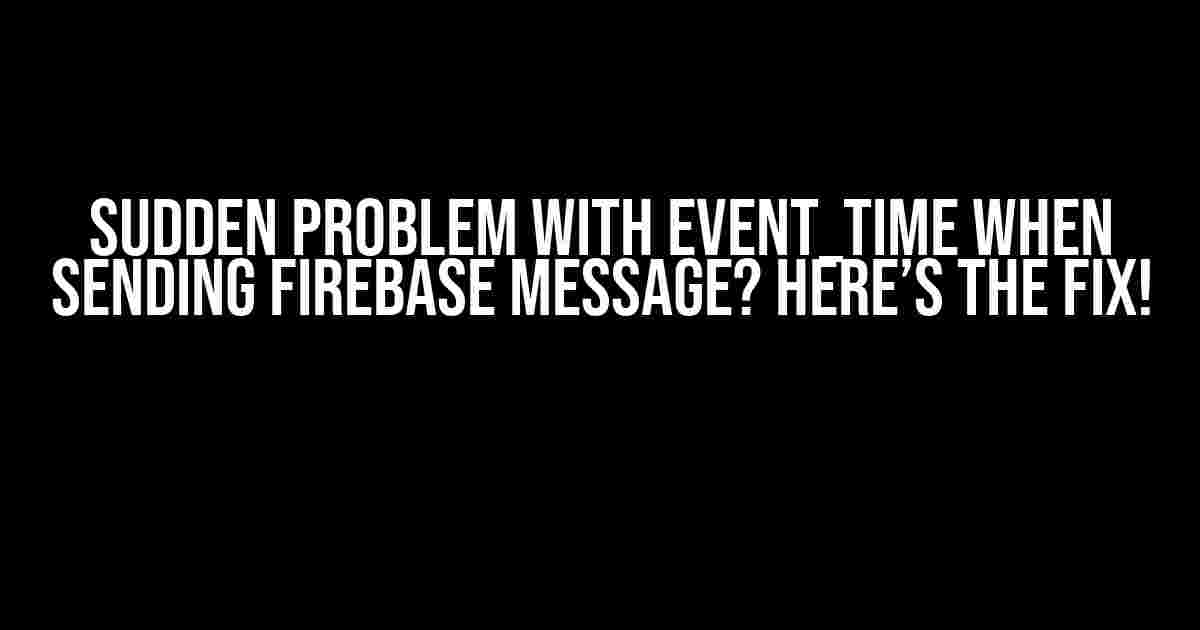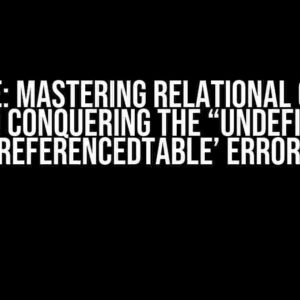Are you experiencing a sudden problem with event_time when sending Firebase messages? You’re not alone! Many developers have encountered this frustrating issue, but don’t worry, we’ve got you covered. In this article, we’ll delve into the causes, consequences, and most importantly, the solutions to this pesky problem.
What is Event_Time in Firebase?
Before we dive into the problem, let’s quickly understand what event_time is in Firebase. Event_time is a crucial parameter in Firebase Cloud Messaging (FCM) that specifies the time when a notification or message is triggered. It’s usually set by the developer when sending a message through the Firebase API. The event_time is used to schedule messages for future delivery or to timestamp events in analytics.
The Problem: Sudden Issue with Event_Time
So, what’s the problem? You’ve been sending Firebase messages smoothly, and suddenly, you start receiving errors or unexpected behavior when setting the event_time. This issue can manifest in different ways, such as:
- Messages not being delivered or delayed
- Incorrect timestamping in analytics
- Error messages when setting event_time
- Unpredictable behavior in message handling
These symptoms can be frustrating, especially when you’re trying to deliver critical notifications or track important events. But don’t worry, we’ll help you identify the causes and provide solutions to get you back on track.
Causes of the Sudden Problem with Event_Time
There are several reasons why you might be experiencing issues with event_time. Let’s explore some of the most common causes:
- Invalid orIncorrect Event_Time Format: Make sure you’re using the correct format for event_time, which is a Unix timestamp representing the number of seconds since January 1, 1970, 00:00:00 UTC.
- Time Zone Issues: Ensure that your system’s time zone is correctly set and matches the time zone of your Firebase project.
- API Key or Credentials Issues: Verify that your API key or credentials are valid and not expired.
- Server-Side Issues: Check if there are any server-side issues, such as high latency or connection problems, that might be affecting message delivery.
- Client-Side Issues: Inspect your client-side code for any errors or incorrect implementations that might be causing the issue.
Solutions to the Sudden Problem with Event_Time
Now that we’ve identified the causes, let’s dive into the solutions:
Solution 1: Verify Event_Time Format
Double-check that your event_time is in the correct format. Use a Unix timestamp converter or a programming language’s built-in functions to ensure the correct format. For example, in JavaScript:
const eventTime = Math.floor(Date.now() / 1000);
Solution 2: Set Correct Time Zone
Make sure your system’s time zone is correctly set and matches the time zone of your Firebase project. You can do this by:
- Checking your system’s time zone settings
- Verifying your Firebase project’s time zone in the Firebase console
Solution 3: Verify API Key and Credentials
Check that your API key or credentials are valid and not expired. You can do this by:
- Verifying your API key in the Firebase console
- Regenerating a new API key if it’s expired
Solution 4: Troubleshoot Server-Side Issues
If you suspect server-side issues, try:
- Checking your server’s logs for any error messages
- Verifying your server’s connectivity and latency
Solution 5: Inspect Client-Side Code
Inspect your client-side code for any errors or incorrect implementations that might be causing the issue. Use debugging tools or log statements to identify any issues.
Best Practices to Avoid Sudden Problems with Event_Time
To avoid encountering sudden problems with event_time in the future, follow these best practices:
- Use a consistent time zone across your project
- Verify API keys and credentials regularly
- Use a reliable timestamp generator or converter
- Test your implementation thoroughly before deployment
- Monitor your server-side logs for any error messages
Conclusion
A sudden problem with event_time when sending Firebase messages can be frustrating, but by following the solutions and best practices outlined in this article, you should be able to resolve the issue and get back to delivering timely notifications and tracking important events.
| Causes | Solutions |
|---|---|
| Invalid event_time format | Verify event_time format using Unix timestamp converter or programming language’s built-in functions |
| Time zone issues | Set correct time zone on system and verify Firebase project’s time zone |
| API key or credentials issues | Verify API key and credentials are valid and not expired |
| Server-side issues | Troubleshoot server-side issues by checking logs and verifying connectivity |
| Client-side issues | Inspect client-side code for errors or incorrect implementations |
By being proactive and following these guidelines, you’ll be able to avoid sudden problems with event_time and ensure a smooth experience for your users.
Frequently Asked Question
Stuck with the sudden issue of event_time when sending Firebase messages? Don’t worry, we’ve got you covered! Here are some frequently asked questions to help you troubleshoot the problem:
What is the event_time field, and why is it causing issues?
The event_time field is a timestamp that specifies when the event occurred. If you’re suddenly experiencing issues with it, it might be because the timestamp is in the wrong format or is missing altogether. Make sure to check your code and ensure that the event_time is properly formatted and included in your Firebase message.
How do I ensure the event_time field is correctly formatted?
The event_time field should be a Unix timestamp in seconds, which represents the number of seconds that have elapsed since January 1, 1970. You can use a timestamp generator tool or a programming language’s built-in timestamp function to get the correct format. For example, in JavaScript, you can use the Date.now() function to get the current timestamp.
What happens if I omit the event_time field when sending a Firebase message?
If you omit the event_time field, Firebase will automatically assign a timestamp when the message is received by the Firebase server. However, this might not be the desired behavior, especially if you need to track events in a specific order or want to ensure that the timestamp is accurate. It’s always best to include the event_time field with the correct timestamp to avoid any potential issues.
Can I use a future timestamp for the event_time field?
Yes, you can use a future timestamp for the event_time field, but be aware that it might affect how Firebase processes your message. If the timestamp is too far in the future, Firebase might not process the message immediately, and it might be delayed or even discarded. It’s recommended to use a timestamp that is close to the current time or slightly in the future to avoid any issues.
What tools can I use to troubleshoot event_time issues?
To troubleshoot event_time issues, you can use tools like the Firebase console, Firebase DebugView, or third-party logging and analytics tools. These tools can help you inspect the messages being sent, verify the event_time field, and identify any potential issues. Additionally, you can use tools like Postman or cURL to test and validate your Firebase API requests.




